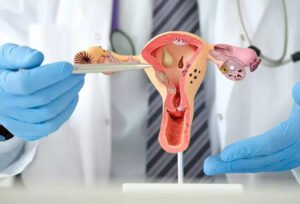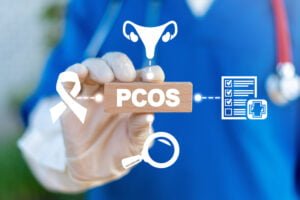Polycystic Ovary Syndrome (PCOS) is a common endocrine disorder affecting individuals of reproductive age, and one of its hallmark features is anovulation or irregular ovulation. This can pose a significant challenge for women trying to conceive. However, advancements in medical science have led to the development of various PCOS ovulation medications designed to regulate ovulation and enhance fertility. In this comprehensive guide, we will explore the causes of anovulation in PCOS, the importance of ovulation, and the different medications available to stimulate ovulation.
Contents
- 1 Understanding PCOS and Ovulation
- 2 Different Medications for PCOS Ovulation
- 2.1 Clomiphene Citrate (Clomid)
- 2.2 Letrozole (Femara)
- 2.3 Metformin
- 2.4 Gonadotropins (FSH and LH)
- 2.5 Inositol
- 2.6 Luteinizing Hormone (LH) Supplements
- 2.7 Dopamine Agonists (Bromocriptine, Cabergoline)
- 2.8 Aromatase Inhibitors (Anastrozole)
- 2.9 Human Chorionic Gonadotropin (hCG)
- 2.10 Selective Estrogen Receptor Modulators (SERMs)
- 2.11 GnRH Agonists and Antagonists
- 2.12 Estrogen Receptor Modulators (SERMs)
- 2.13 DHEA (Dehydroepiandrosterone)
- 2.14 Pentoxifylline
- 2.15 Melatonin
- 2.16 N-acetylcysteine (NAC)
- 2.17 Vitamin D
- 3 How To Take Medications for PCOS Ovulation?
- 4 Conclusion
Understanding PCOS and Ovulation

One of the primary and defining features of PCOS is anovulation, which refers to the absence or irregularity of ovulation—the release of a mature egg from the ovaries. Understanding the connection between PCOS and ovulation is crucial for managing the condition, addressing fertility challenges, and promoting overall reproductive health.
1. Hormonal Imbalances:
- Increased Androgens: Women with PCOS often have elevated levels of androgens, such as testosterone. These high androgen levels can disrupt the normal hormonal balance needed for the menstrual cycle and ovulation.
- Insulin Resistance: Insulin resistance is another common feature of PCOS. It occurs when the body’s cells don’t respond effectively to insulin, leading to higher insulin levels. Insulin resistance can contribute to elevated androgen production and disrupt ovulatory processes.
2. Effect on Ovulatory Function:
- Anovulation: Women with PCOS frequently experience anovulation or irregular ovulation. The hormonal imbalances associated with PCOS can interfere with the usual regulatory signals that control the menstrual cycle, leading to the absence of ovulation.
- Menstrual Irregularities: The lack of regular ovulation often results in irregular menstrual cycles, with some women experiencing infrequent or absent periods.
3. Ovarian Follicles and Cysts:
- Follicle Development: In a typical menstrual cycle, ovarian follicles mature, and one dominant follicle releases an egg during ovulation. In PCOS, the ovaries may contain numerous small follicles that struggle to reach maturity, leading to a lack of dominant follicles and infrequent ovulation.
- Cyst Formation: The small follicles on the ovaries can accumulate, forming cysts. These cysts are not harmful but contribute to the characteristic appearance of polycystic ovaries observed in ultrasound imaging.
Different Medications for PCOS Ovulation

Anovulation, or irregular ovulation, is a common feature of PCOS, leading many individuals with the condition to seek medications that can help regulate ovulation and improve fertility. Here are different medications commonly used for inducing ovulation in women with PCOS:
Clomiphene Citrate (Clomid)
- Mechanism of Action: Clomid is a selective estrogen receptor modulator that acts on the hypothalamus and pituitary gland, stimulating the release of follicle-stimulating hormone (FSH) and luteinizing hormone (LH). This, in turn, induces ovulation.
- Usage: It is often the first-line medication for inducing ovulation in women with PCOS.
- Administration: Taken orally for a specific period in the menstrual cycle.
Letrozole (Femara)
- Mechanism of Action: Letrozole is an aromatase inhibitor that reduces estrogen production. This reduction leads to increased levels of FSH, promoting the development and release of eggs from the ovaries.
- Usage: Letrozole is another medication commonly used for ovulation induction in women with PCOS, especially for those who do not respond well to Clomid.
- Administration: Also taken orally for a specific period during the menstrual cycle.
Metformin
- Mechanism of Action: Metformin is an insulin-sensitizing medication that helps improve insulin resistance, a common issue in PCOS. Addressing insulin resistance indirectly affects ovarian function and may promote more regular ovulation.
- Usage: Metformin is often prescribed to manage insulin resistance in women with PCOS. It may be used alone or in combination with other ovulation-inducing medications.
- Administration: Typically taken orally.
Gonadotropins (FSH and LH)
- Mechanism of Action: Injectable gonadotropins directly stimulate the ovaries to produce multiple eggs. FSH and LH are hormones that play a key role in follicle development and ovulation.
- Usage: Gonadotropins are often used when oral medications like Clomid or Letrozole are not effective.
- Administration: Administered through injections and requires close monitoring due to the risk of overstimulation.
Inositol
- Mechanism of Action: Inositol, particularly myo-inositol, is a naturally occurring compound that has been studied for its potential to improve ovarian function and insulin sensitivity in women with PCOS.
- Usage: Available as a supplement, inositol is often used as an adjuvant therapy to improve overall reproductive health in women with PCOS.
- Administration: Taken orally as a supplement.
Luteinizing Hormone (LH) Supplements
- Mechanism of Action: In some cases, LH supplementation may be used in conjunction with FSH or as a standalone treatment to induce ovulation.
- Usage: LH supplements are administered through injections and are often part of a more complex fertility treatment plan.
Dopamine Agonists (Bromocriptine, Cabergoline)
- Mechanism of Action: These medications may be prescribed in cases where elevated prolactin levels are contributing to irregular ovulation. Dopamine agonists help reduce prolactin secretion from the pituitary gland.
- Usage: Primarily used when hyperprolactinemia is present alongside PCOS.
- Administration: Typically taken orally.
Aromatase Inhibitors (Anastrozole)
- Mechanism of Action: Similar to Letrozole, aromatase inhibitors reduce estrogen production, indirectly leading to increased FSH levels and improved ovulation.
- Usage: Anastrozole may be considered as an alternative to Letrozole in some cases.
- Administration: Administered orally.
Human Chorionic Gonadotropin (hCG)
- Mechanism of Action: hCG is a hormone that mimics the action of LH, triggering the release of mature eggs from the ovaries.
- Usage: It is sometimes used in combination with other medications to induce ovulation.
- Administration: Administered through injections.
Selective Estrogen Receptor Modulators (SERMs)
- Mechanism of Action: Besides Clomiphene Citrate, other SERMs like Tamoxifen may be considered for inducing ovulation.
- Usage: Tamoxifen may be used in cases where Clomid is not effective or well-tolerated.
- Administration: Typically taken orally.
GnRH Agonists and Antagonists
- Mechanism of Action: Gonadotropin-releasing hormone (GnRH) agonists and antagonists may be used in certain fertility treatment protocols to regulate the release of FSH and LH.
- Usage: These medications are often part of more advanced fertility treatments, such as in vitro fertilization (IVF).
- Administration: Administered through injections.
Estrogen Receptor Modulators (SERMs)
- Mechanism of Action: While primarily used for breast cancer treatment, Tamoxifen, a SERM, may be considered as an alternative for ovulation induction in women with PCOS.
- Usage: Tamoxifen may be considered in cases where other medications are not suitable or effective.
- Administration: Administered orally.
DHEA (Dehydroepiandrosterone)
- Mechanism of Action: DHEA is a precursor to both androgens and estrogens. Some studies suggest that DHEA supplementation may improve ovarian function and enhance fertility in women with PCOS.
- Usage: DHEA may be used as a supplement in conjunction with other medications or treatments.
- Administration: Typically taken orally.
Pentoxifylline
- Mechanism of Action: Pentoxifylline is a medication that may have anti-inflammatory and vasodilatory effects. Some studies have explored its potential to improve ovarian function and fertility in women with PCOS.
- Usage: Pentoxifylline may be considered in specific cases as part of a comprehensive treatment plan.
- Administration: Administered orally.
Melatonin
- Mechanism of Action: Melatonin is a hormone that regulates sleep-wake cycles. Some research suggests that melatonin supplementation may have a positive impact on reproductive outcomes, including ovulation, in women with PCOS.
- Usage: Melatonin may be used as a supplement, often in combination with other treatments.
- Administration: Typically taken orally.
N-acetylcysteine (NAC)
- Mechanism of Action: NAC is an antioxidant that may help reduce insulin resistance and improve ovulatory function in women with PCOS.
- Usage: NAC may be used as a supplement, often in conjunction with other medications.
- Administration: Typically taken orally.
Vitamin D
- Mechanism of Action: Adequate vitamin D levels are essential for reproductive health. Some studies suggest that vitamin D supplementation may have a positive impact on ovarian function and fertility in women with PCOS.
- Usage: Vitamin D supplements may be recommended based on individual levels and needs.
- Administration: Typically taken orally.
How To Take Medications for PCOS Ovulation?

Managing medications for PCOS-related ovulation involves careful adherence to prescribed treatment plans. Here are general guidelines on how to take these medications:
- Consultation with a Healthcare Provider: Before starting any medication, consult with a healthcare provider, preferably a reproductive endocrinologist or gynecologist specializing in fertility. They will evaluate your medical history, conduct necessary tests, and recommend a personalized treatment plan.
- Understanding the Prescribed Medication: Gain a comprehensive understanding of the prescribed medication, including its purpose, mechanism of action, and potential side effects. Ask your healthcare provider any questions you may have to ensure clarity.
- Follow the Prescribed Dosage: Adhere strictly to the prescribed dosage and schedule provided by your healthcare provider. Medications for PCOS ovulation are often administered at specific times in the menstrual cycle, and it’s crucial to follow these instructions for optimal efficacy.
- Consistent Timing: Take the medication at the same time each day, as instructed. Consistent timing is essential for regulating hormone levels and promoting regular ovulation.
- Oral Medications: If the medication is an oral tablet, swallow it whole with a full glass of water, unless otherwise directed. Avoid crushing or breaking tablets unless your healthcare provider advises otherwise.
- Patience and Persistence: Understand that achieving regular ovulation and improved fertility may take time. Be patient and persistent in following the prescribed treatment plan and recommendations from your healthcare provider.
Conclusion
In conclusion, managing PCOS-related ovulation with medications requires a collaborative effort between individuals and healthcare providers. Adhering to prescribed dosages, schedules, and lifestyle recommendations is crucial.
With diligence and guidance, these medications can help regulate ovulation, addressing a significant aspect of PCOS and offering hope for those seeking to build their families. Always consult with healthcare professionals for tailored advice and ongoing support on this reproductive health journey.
If you are facing PCOS-related issues, PCOS treatment at HerMantra can help. Book your free trial online Pcos treatment session now.


